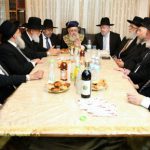It’s a story, of hope and tragedy. The hope lies in the fact that some rabbis are capable of creative halakhic thinking to bring relief to those who suffer under the law’s inequity. The tragedy is that they aren’t the only rabbis in this story. Continue reading The Get from Safed
Monthly Archives: December 2016
The New Modern Orthodox Platform
The Rabbinical Council of America (RCA) is the largest association of rabbis who profess a “Modern Orthodox” outlook. Recently, the RCA decided that it was time to adopt a statement of principles, entitled “Raising the Banner of Modern Orthodoxy,” which the organization describes as “A Proud Platform for Modern Orthodoxy for the 21st Century.” The platform takes on the increasingly difficult task of defining the “Modern Orthodox” position in the face of challenges from two sides. Looking to its right, the RCA wishes to distinguish its Judaic outlook from that of the ḥaredi or “ultra” Orthodox sects that consciously reject most sorts of accommodation with the culture of modernity. And looking to its left, it seeks to define itself against so-called “Open Orthodoxy,” which declares its loyalty to Orthodox halakhah while advocating an even more “open” posture toward contemporary cultural values, particularly regarding the expansion of women’s participation in public religious life. Hence, the pressing need for a platform to spell out in detail the RCA’s version of Modern Orthodoxy.[1]
How successful is the platform in accomplishing its goal? To our decidedly non-Orthodox way of thinking, the text strikes a welcome note of moderation. “Reflecting upon how frequent and tragic schism has been in the history of our people,” the document calls upon Modern Orthodox Jews to engage “in constructive religious debate that is ‘for the sake of heaven’ by defending our opponents’ honor and motives; by emphasizing points of accord as much as areas of dissent; and, by seeking truth with grace, civility, and love.” In a religious (not to mention political) environment too often poisoned by the rhetoric of extremism (here’s just the latest example), the RCA calls upon the members of its community to think carefully about the tone of their speech. That’s a message that all of us could (and obviously should) take to heart. Also positive is the platform’s call for Jews to comply “punctiliously” with non-discriminatory state legislation (“in fulfillment of the halachic requirement of dina de’malchuta dina“) and to pursue “knowledge of the sciences and humanities in order to know God’s Creation.” These statements sound pedestrian to progressives, but within the world of Orthodoxy they’re a certified big deal, a forthright repudiation of some of the more disagreeably parochial and obscurantist elements of far-right Orthodox culture.

